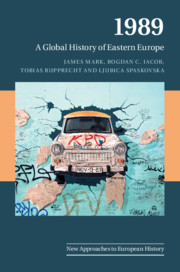3. - Europeanisation
Published online by Cambridge University Press: 29 August 2019
Summary
Histories of the growth of a united Europe are commonly told from a Western perspective: 1989 marked a natural ‘return to Europe’ for a continental periphery ‘captured’ by Soviet Communism – a key moment on the road to the absorption of the East into the European project. We argue that such histories ignore Eastern Europeans’ role and the contested nature of what constituted Europe. Postwar decolonisation had thrown up visions of a less bordered Europe or Eurafrican-style economic projects in both East and West. Eastern European actors from the early 1970s played important roles in contributing to building a different Europe based on East-West reconciliation, cultural unity, and powerful forms of bordering to the South (‘Fortress Europe’). Regional elites were pivotal in the establishment of the Helsinki Process which enabled such economic and cultural integration, and in promoting European imaginaries which reified historical Christian whiteness and excluded Africa and Islam. Central-Eastern European intellectuals effectively promoted a strictly bordered vision of the region to the West as they sought to integrate themselves into its structures in the 1990s. This vision remained powerful in those Eastern states which joined the European Union; an independent Russia, however, turned quickly to Eurasianism.
Keywords
Information
- Type
- Chapter
- Information
- 1989A Global History of Eastern Europe, pp. 125 - 172Publisher: Cambridge University PressPrint publication year: 2019
